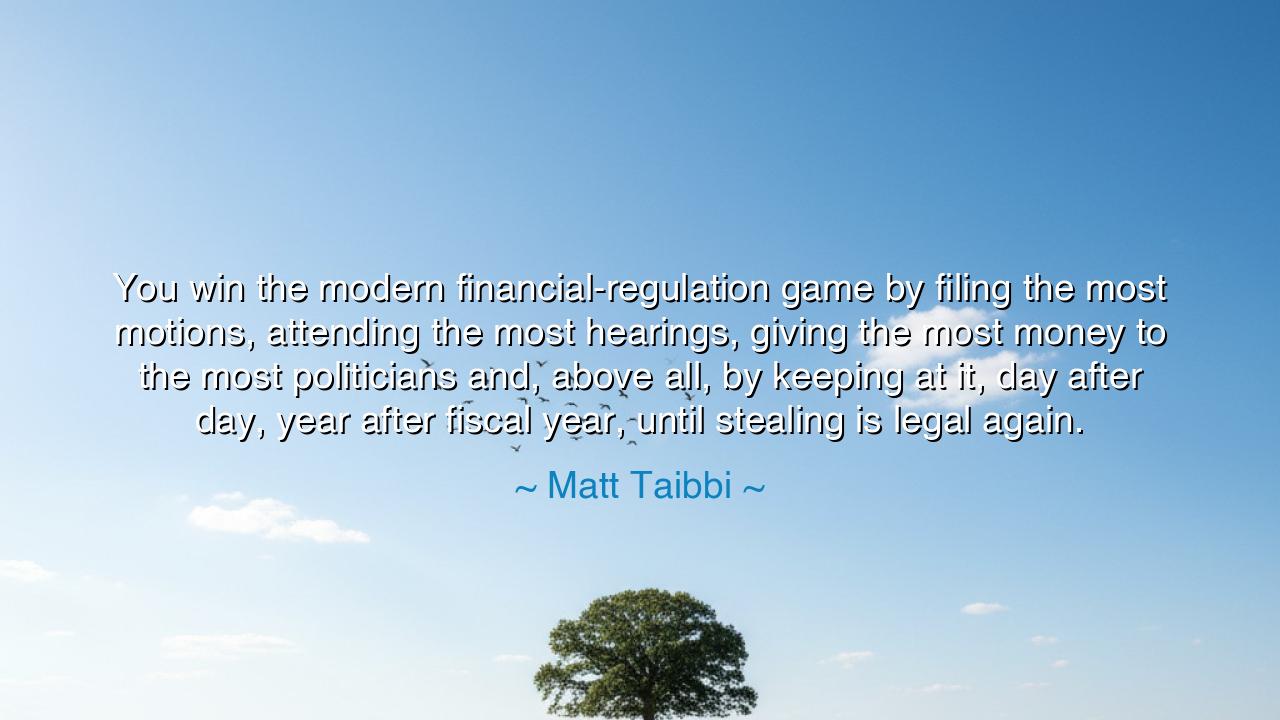
You win the modern financial-regulation game by filing the most
You win the modern financial-regulation game by filing the most motions, attending the most hearings, giving the most money to the most politicians and, above all, by keeping at it, day after day, year after fiscal year, until stealing is legal again.






In the words of Matt Taibbi: “You win the modern financial-regulation game by filing the most motions, attending the most hearings, giving the most money to the most politicians and, above all, by keeping at it, day after day, year after fiscal year, until stealing is legal again.” These words strike with the fury of an oracle, exposing the grim theater of power where law is bent, not for justice, but for profit. They reveal a truth the ancients long understood—that corruption does not always march openly in the streets; often, it cloaks itself in ritual, bureaucracy, and persistence, until wrongdoing is sanctified as law itself.
The ancients spoke of this danger in the fall of republics. Cicero, in the dying days of Rome, lamented that the courts and senates were no longer halls of justice, but marketplaces where verdicts and decrees were bought and sold. Taibbi’s vision is no different: the financial game is not won by virtue, innovation, or service to the people, but by sheer endurance in manipulation—by those who, through endless motions and hearings, wear down the guardians of justice until they collapse into complicity.
Consider the tale of the Great Depression. In the years before 1929, banks speculated wildly, enriching themselves while ordinary citizens were left vulnerable. When the crash came, millions were ruined, yet the architects of the disaster often escaped untouched. It was only through the New Deal and the creation of strong regulations—such as the Glass-Steagall Act—that balance was restored. Yet decades later, through relentless lobbying, through politicians courted and rules eroded year by year, those safeguards were dismantled. By the time of the 2008 financial crisis, stealing had become legal again, hidden beneath the respectable cloak of deregulation.
This is the heart of Taibbi’s lament: corruption does not conquer swiftly, but patiently. It advances like a slow tide, inch by inch, until the shore is swallowed. One gift to a lawmaker here, one amendment there, one delayed hearing or quiet repeal, and soon the citadel of justice is undermined. It is persistence, not brilliance, that makes the thieves victorious. Where the honest man fights for a season, the corrupted fight for decades, knowing that time itself is their ally.
The deeper meaning of the quote is a warning: that society falls not only through violence but through the normalization of injustice. When stealing is disguised as financial innovation, when bribery is renamed campaign finance, when exploitation is baptized as growth, then corruption no longer fears exposure—it thrives in daylight. The people, lulled by the language of law, fail to see that they are being devoured by wolves dressed in robes of legality.
History offers us many parallels. The East India Company, under the banner of trade, slowly rewrote the rules of commerce until it enslaved entire nations. What began as business became empire, and plunder was declared lawful. The lesson is the same: once the guardians of justice are bribed or worn down, once the people are lulled into acceptance, stealing becomes legal, and only great upheaval can restore balance.
So let this teaching endure: do not be deceived by legality alone, for not all that is legal is just. Remain vigilant against the slow creep of corruption. Demand transparency from leaders, resist the seduction of money in politics, and remember that endurance is not only the tool of the corrupt, but can also be the weapon of the righteous. Let citizens, too, keep at it—day after day, year after year—until justice is restored, and until the laws once bent to protect thieves are bent back to protect the people. For the ancients remind us: the health of a republic is not measured by its wealth, but by the fidelity of its laws to truth and fairness.






AAdministratorAdministrator
Welcome, honored guests. Please leave a comment, we will respond soon